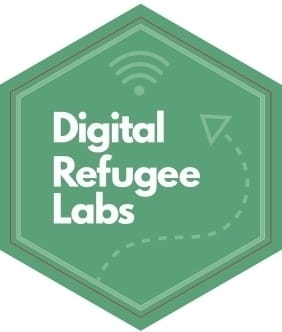
The Digital Refugee Labs project has ended…
English version below!
Von März bis Ende Oktober haben wir, das Codefor-Team, gemeinsam mit vier Labs und deren Lab Leads die Digital Refugee Labs organisiert. Unterstützt wurde das Projekt von der Bundeszentrale für politische Bildung. Ein kleiner Abschlussbericht, ein Längerer folgt im Laufe der nächsten Wochen.
Die Idee war es, die technische Expertise der OK Labs für Initiativen zugänglich zu machen, da diesen oft das Wissen über digitale Tools fehlt. Jedoch haben genau diese Organisationen sehr viel Erfahrung im Bereich der Flüchtlingshilfe. Zentral für den Schwerpunkt war daher die Vernetzung von existierenden Initiativen, Organisationen und Institutionen mit den OK Labs. Weniger um neue Projekte zu entwickeln, sondern um eine Unterstützung von vorhandenem Engagement zu ermöglichen.
Mit den OK Labs in Leipzig, Hamburg, Berlin und Karlsruhe haben wir zwischen Mai und Juli vier Kick-Off-Workshops organisiert, um die verschiedenen Akteure zusammen zu bringen und einen Tag lang gemeinsam zu überlegen, wo der virtuelle Schuh drückt und wie die OK Labs die Initiativen unterstützen können. Dabei hat uns das Team von Zero360 mit ihrem Coaching und Design-Thinking-Methoden unterstützt.
Nach dem Kickoff begann die Kooperation - in den letzten Monaten haben die Teams sich mit oder im OK Lab regelmäßig getroffen, um weiter an ihren Projekten zu arbeiten. Nicht alle Projekte sind bis heute aktiv, einige sind abgeschlossen, manche wurden abgebrochen. Die Projekte, die weiter geführt wurden, können auf www.codefor.de/digitalrefugeelabs angeschaut werden. Die Projekte sind so vielfältig wie die Expertise der Teilnehmenden als auch der Herausforderungen, denen sie sich widmen wollen. Schaut am Besten selber mal rein! An den meisten Projekten wird weiterhin in den Labs gearbeitet - denn die Digital Refugee Labs sind hiermit keineswegs beendet, es gibt noch viel zu tun!
Die Digital Refugee Labs haben ein paar Projekte unterstützt und vielen zu mehr Sichtbarkeit und Teamstärke verholfen. Die Workshops waren dank der inhaltlichen Unterstützung von Zero360, der finanziellen Unterstützung der BpB und natürlich dank dem Einsatz der lokalen Lab-Mitglieder wirklich schöne Ereignisse, auf denen sich lokale Initiativen mit den Engagierten OK Labs und einigen Leuten, die selber geflohen sind, austauschen konnten. Wir sind uns gewiss, dass die Vernetzung, die dort geschaffen wurde, auch weiterhin Früchte tragen kann und wird.
Einige Projekte sind noch am Entstehen, andere suchen bereits nach einer Möglichkeit, ihre Projekt aus der Prototypen-Phase heraus in einen nachhaltigeren und stabileren Zustand zu überführen, beispielsweise durch Funding. Erstaunlicherweise sind noch immer wenige Ressourcen für kleine Projekte zugänglich, der Prototype Fund - ebenfalls ein Projekt der Open Knowledge Foundation - versucht, diese Lücke zu schließen, es gäbe aber genügend Raum für einen Fund der sich explizit an Refugee-Projekte richtet. Wir hoffen, dass sich entsprechende Chancen im nächsten Jahr noch auftun werden.
Tausend Dank an alle, die das Projekt möglich gemacht haben, vor allem den lokalen Lab Mitgliedern. Euer Einsatz und eure Bereitschaft, euch mit einem beträchtlichen Teil eurer Freizeit für die Belange eurer Mitmenschen einzusetzen, sind immer wieder erstaunlich, bewundernswert und unheimlich wichtig.
The Digital Refugee Lab project is over - but the work continues!
From March to October 2016, the Code for Germany team and four Open Knowledge Labs conducted the program “Digital Refugee Labs”, with support from the Federal Institute for Political Education. This is just a small update, a more elaborate report will follow in the next weeks.
The idea of the program was to make the OK Labs’ expertise accessible to refugee initiatives. These kind of organizations often lack the knowledge about technology and useful tools that could facilitate their work. However, they usually have experience in the field of migration and asylum that exceed most of the technologists’ scope. Therefore, setting up ties and enabling cooperation between the Labs and projects, institutions and organizations was at the core of the Digital Refugee Labs. We found it important to stress that we did not want to add new projects to the pool of technology and tools, but rather support and strengthen the existing initiatives.
We organized four workshops with the OK Labs in Leipzig, Hamburg, Berlin and Karlsruhe to let the different actors meet in one spot. The workshops were facilitated by Zero360 coaches, who helped us identify challenges that could be tackled by the OK Labs.
The workshops served as a kickoff for a collaboration over the past few months. The teams met on a regular basis on the OK Labs to continue their work on the projects. The projects that were started can all be seen here: www.codefor.de/digitalrefugeelabs The projects are as diverse as the topics and challenges and people that contributed. We invite you to have a look for yourself. Most of the projects are still in progress - hence the Digital Refugee Labs are not completed! There is still a lot of work to do.
The Digital Refugee Labs have supported some project and helped many to gain more team power and visibility. With the help of Zero360, the BpB and the local lab members, the workshops turned out to be really constructive, informative, nice and fruitful events where local initiatives could connect and exchange with lab volunteers and some people that have a refugee background. We are positive that these newly created ties will carry more fruits in the future.
Some of the projects are still in progress, others are already seeking a way to transfer their project in a sustainable post-prototype model. Unfortunately, there are still little suitable resources available in terms of funding. The Prototype Fund - another project of the Open Knowledge Foundation - seeks to close this gap, but there is still plenty of room for further funding, especially funding that is directed explicitly at tech projects for refugees is still missing. We hope that this will be acknowledged next year and that easier financial support will be offered.
Needless to say: Sincere thanks to everyone who made this project possible, especially to the local lab members. Your commitment and willingness to invest your time and knowledge for the needs of others and your city never cease to amaze.
